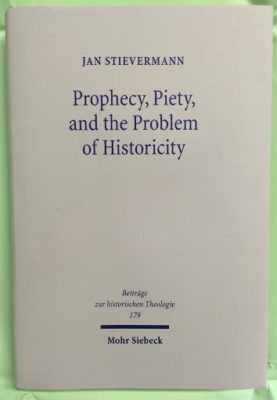Editor's Note
“Focusing on how ideas were concretely embedded and how they affected the real lives of people”—Jan Stievermann
 So many insights, with more to come! Thanks for joining us on a virtual road trip to visit some of our USIH Book Prize winners, and see how their scholarship connects to our #USIH2020 conference theme of “Revolution & Reform
So many insights, with more to come! Thanks for joining us on a virtual road trip to visit some of our USIH Book Prize winners, and see how their scholarship connects to our #USIH2020 conference theme of “Revolution & Reform
.” We chatted with Jan Stievermann, professor of the history of Christianity in the U.S. at Heidelberg University, and director of the Jonathan Edwards Center Germany. Check out his Prophecy, Piety, and the Problem of Historicity: Interpreting the Hebrew Scriptures in Cotton Mather’s Biblia Americana,
which won the 2017 USIH Book Prize. This year’s entries are due 15 April 2020 and you can find the prize submission details here. We’d love to know what YOU’RE working on: Connect with the USIH community on Facebook and Twitter (@Ideas_History).
What are you working on now?
Jan Stievermann: I’m mostly working on the scholarly, fully annotated, edition of vol. 10 of Cotton Mather’s “Biblia Americana” (1693-1728, the manuscript is located at the Massachusetts Historical Society), the first comprehensive bible commentary produced in British North America. This volume contains Mather’s copious annotations on Hebrews to Revelation. The publication is scheduled for 2021. Given the importance of millennialism in the intellectual history of early America and given too Mather’s formidable role in shaping that tradition, the commentary on Revelation is of special interest. Concomitantly, I’m finishing up two co-edited volumes: The Oxford Handbook of Jonathan Edwards (with Douglas Sweeney) and the Handbook of American Romanticism (with Philipp Loeffler and Clemens Spahr) that is coming out with De Gruyter.
 Within our field of intellectual history, what topics or approaches are you excited about?
Within our field of intellectual history, what topics or approaches are you excited about?
Stievermann: The two handbooks that I’m co-editing clearly show a tendency by scholars of 18th and 19th century American culture and religion to integrate intellectual history with approaches such as social history, lived religion, or book and publication history, focusing on how ideas were concretely embedded and how they affected the real lives of people. Even with “traditionalists” subjects such as Edwards or American Romanticism, there is clearly an attempt to explore how what appears to be the lofty ideas of “great white men” mattered to ordinary and marginalized groups in the US but also across the globe, who appropriated them for their own purposes. For example, we have fascinating chapters on the reception histories of Edwardsean theology in Asia and Africa, or essays discussing Transcendentalism as a part of transatlantic social movements and publishing networks. I applaud both of these trends.
This year, our annual meeting theme is “Revolution and Reform.” Can you reflect on how those ideas connect to your scholarship?
Stievermann: In many ways, but here is one: In his time, Mather was one of New England’s leading proto-evangelical reformers who in the spirit of religious voluntarism sought to introduce new charitable institutions and moral reform societies, while also pouring his energy into revivalism and missions. At the same time, he expected the greatest revolution in the history of mankind to be just around the corner: the return of Christ and the onset of His millennial kingdom. That revolution would bring to an end the present social order and radically and supernaturally transform everything on earth. And yet, Mather (applying, as it were, the message of the parable of the talents in the Bible) tirelessly labored to improve things in the here and now and to win souls for Christ: a fascinating tension that can be found again and again in the history of American Protestantism.

One Thought on this Post
S-USIH Comment Policy
We ask that those who participate in the discussions generated in the Comments section do so with the same decorum as they would in any other academic setting or context. Since the USIH bloggers write under our real names, we would prefer that our commenters also identify themselves by their real name. As our primary goal is to stimulate and engage in fruitful and productive discussion, ad hominem attacks (personal or professional), unnecessary insults, and/or mean-spiritedness have no place in the USIH Blog’s Comments section. Therefore, we reserve the right to remove any comments that contain any of the above and/or are not intended to further the discussion of the topic of the post. We welcome suggestions for corrections to any of our posts. As the official blog of the Society of US Intellectual History, we hope to foster a diverse community of scholars and readers who engage with one another in discussions of US intellectual history, broadly understood.
It’s very well documented. It was helpful. Thank you.